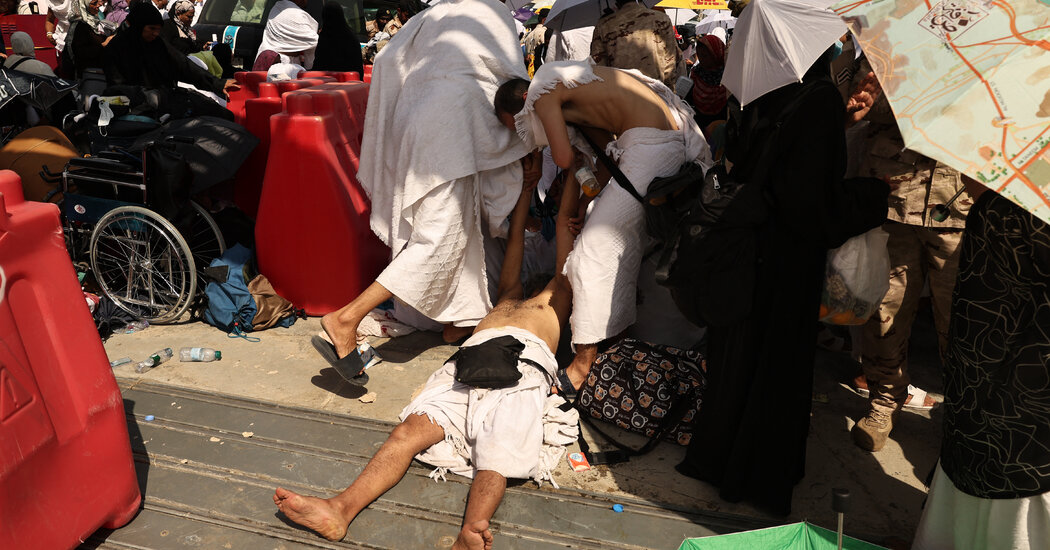Dozens of people have died amid scorching temperatures during the annual hajj pilgrimage to the holy city of Mecca in Saudi Arabia, according to reports from official media in Europe, the Middle East and Africa.
With forecasts saying that temperatures would top 113 degrees Fahrenheit, or 45 degrees Celsius, on Tuesday, Saudi officials issued advisories to pilgrims urging them to stay hydrated, minimize outdoor activities, and carry umbrellas to block direct sunlight.
While Saudi Arabia had not reported deaths, news reports from a number of countries whose faithful went to the hajj suggested that the heat had proved deadly.
On Sunday, Jordan’s official news agency said 14 pilgrims had died from exposure to extreme sun and heat. On Wednesday, the agency said burial permits had been issued for 41 Jordanian pilgrims in Mecca, but did not provide details on the causes of death.
Tunisia’s Foreign Ministry said at least 35 Tunisians had died, the state-run Agence Tunis Afrique Presse reported on Tuesday, noting the “sharp rise in temperatures” and “scorching sun” that had accompanied the hajj.
At least 13 people from India’s Kerala State died performing hajj, according to Sathyapalan C., a local official, while the Russian state news agency TASS reported the deaths of four citizens from “natural causes related to health and age.” Three pilgrims from Senegal also died, according to a statement from the country’s Foreign Ministry, without citing a cause of death.
And Egypt’s Foreign Ministry said consular staff in Saudi Arabia were working “around the clock” to help facilitate burials and searches for missing Egyptian pilgrims, without giving a number. Egypt’s Ministry of Immigration has set up a 24-hour “operations room” amid numerous distress calls about missing relatives, the State Information Service said in a statement. It added that officials were visiting hospitals and medical centers in Saudi Arabia to search for any missing pilgrims and to assist with repatriating the dead.
Saudi ministries did not immediately respond to questions about the reports of deaths.
Muslims travel to Mecca from around the world each year to perform the five-day pilgrimage, which ends Wednesday. The hajj is one of the five pillars of Islam; all Muslims who are financially and physically able must perform the ritual at least once in their lives.
The first hajj took place in 632. The pilgrimage is now one of the world’s largest Muslim gatherings. Over the years, it been plagued by a number of calamities, from stampedes to fires to outbreaks of disease. A stampede on a bridge in 2006 killed more than 300 people and another in 2015 killed more than 2,200 people.
Many pilgrims, who are often older, have also experienced heat stress in recent years, with scores dying from the heat. The Saudi authorities had taken measures to reduce the risk of heat stress, including setting up hydration stations and using water mist sprays to cool the air.
On Tuesday, Saudi officials billed this year’s hajj season a “success,” with state media reporting that the health minister, Fahd al-Jalajel expressed “particular satisfaction with the fact that there were no outbreaks or other public health threats despite the significant number of pilgrims and the challenges posed by high temperatures.”
The authorities also cited “advanced cooling systems” and the “consistent availability” of water for pilgrims for ensuring a “smooth and secure hajj for all.”
Hwaida Saad and Pragati K.B. contributed reporting.


